情态动词的推测性用法的几种结构:
情态动词表推测用法总结(整理稿)
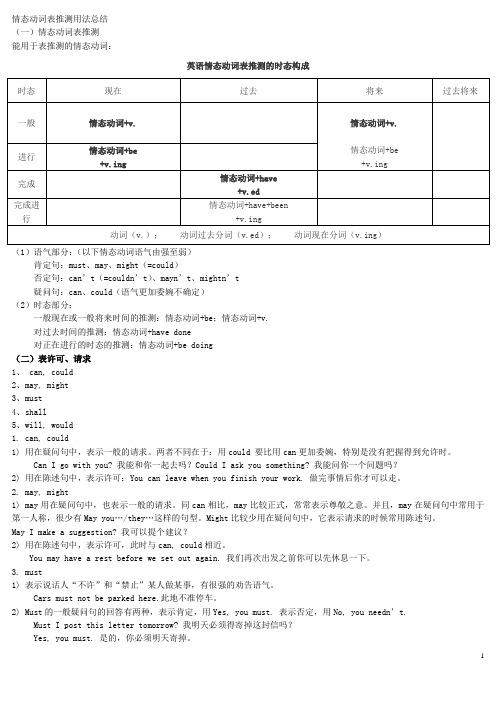
情态动词表推测用法总结(一)情态动词表推测能用于表推测的情态动词:英语情态动词表推测的时态构成(1)语气部分:(以下情态动词语气由强至弱)肯定句:must、may、might(=could)否定句:can’t(=couldn’t)、mayn’t、mightn’t疑问句:can、could(语气更加委婉不确定)(2)时态部分:一般现在或一般将来时间的推测:情态动词+be;情态动词+v.对过去时间的推测:情态动词+have done对正在进行的时态的推测:情态动词+be doing(二)表许可、请求1、 can, could2、may, might3、must4、shall5、will, would1. can, could1) 用在疑问句中,表示一般的请求。
两者不同在于:用could 要比用can更加委婉,特别是没有把握得到允许时。
Can I go with you? 我能和你一起去吗?Could I ask you something? 我能问你一个问题吗?2) 用在陈述句中,表示许可:You can leave when you finish your work. 做完事情后你才可以走。
2. may, might1) may用在疑问句中,也表示一般的请求。
同can相比,may比较正式,常常表示尊敬之意。
并且,may在疑问句中常用于第一人称,很少有May you…/they…这样的句型。
Might比较少用在疑问句中,它表示请求的时候常用陈述句。
May I make a suggestion? 我可以提个建议?2) 用在陈述句中,表示许可,此时与can, could相近。
You may have a rest before we set out again. 我们再次出发之前你可以先休息一下。
3. must1) 表示说话人“不许”和“禁止”某人做某事,有很强的劝告语气。
Cars must not be parked here.此地不准停车。
情态动词表猜测的用法

情态动词表猜测的用法情态动词must,can,could,should,may,might 等可以用在句中表示猜测。
1.“情态动词+动词原形”表示对现在或将来情况的猜测I don’t know where she is. She may be in Wuhan.2.“情态动词+进行式”表示对现在或将来正在进行的情况的猜测At this moment, our teacher must be correcting our exam papers.3.“情态动词+完成式”表示对过去情况的猜测You must have been caught in the rain on your way home yesterday.4.“情态动词+完成进行式”表示对过去正在进行的情况的猜测Your mother must have been looking for you.5.推测的否定形式用can’t/couldn’t,may not/might not表示Mike can’t have found his car, for he came to work by bus this morning.6.句子中含有表示猜测的情态动词时,其反意疑问句的构成不能再用原句中的情态动词,而应根据原句在去掉情态动词的情况下的主谓关系来确定其反问形式。
①The man in the white clothes must be adoctor, isn’t he?②She must have seen the film before,hasn’t she?③He must have an uncle abroad, doesn’the?④You must have met Uncle Wang in theshop yesterday, didn’t you?7.在表示“猜测”方面的区别情态动词must,can,could,should,may,might 都可以用于表示“猜测”(注意:could, might 表示推测时不表示时态, 其推测的程度不如can, may)。
情态动词表推测的用法

情态动词表推测的用法表示推测的情态动词有must, could, may, might, can, should等。
“情态动词+不定式一般式” 表示对现在或将来的推测,“情态动词+不定式进行式”表示对正在进行的动作或事情的推测,“情态动词+不定式完成式”表示对过去的推测。
一、must表示推测的用法must表示推测时,只用于肯定句,表示很大的可能性,意为“一定,准是,必然会”。
其否定形式是can’t/couldn’t (不可能)。
例如:1. You haven’t eaten anything since this morning; you must be hungry.2. That can’t be Mary —she’s in hospital.二、can/could表示推测的用法1. can表示推测时,多用于肯定句和疑问句。
当用于肯定句时,指“有时可能会”,是理论上的可能,其时间意义宽泛不具体。
例如:Even experienced teachers can make mistakes.2. could表示推测时,既可以用于肯定句,又可以用于疑问句。
例如:My book has disappeared. Who could have taken it?3. can’t/couldn’t表示推测时,用于否定句,是语气最强的否定推测,意为“不可能,一定不(是)”。
例如:He can’t/couldn’t have seen her there.4. can/could在疑问句中表示推测时,含有怀疑或疑问的意味,could比can更不确定。
例如:① Can the news be true?② Who can it be?三、may / might表示推测的用法1. may / might表示推测时,用于肯定句,表示无把握的推测,意为“可能,或许”。
(might 比may 更加不肯定,更无把握)。
情态动词表示推测的用法
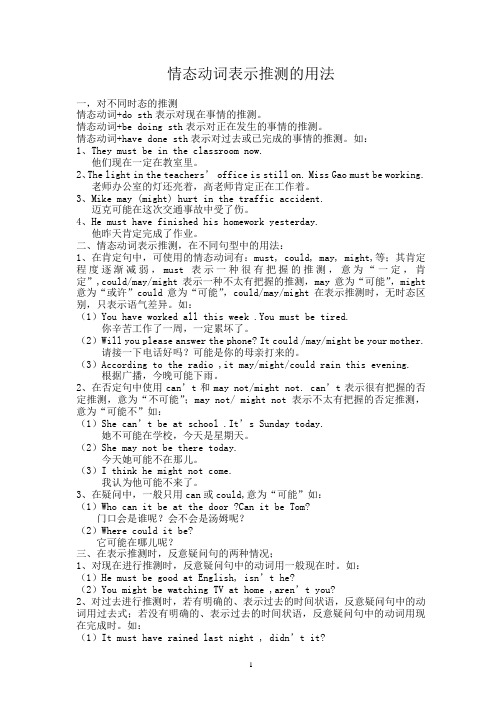
情态动词表示推测的用法一,对不同时态的推测情态动词+do sth表示对现在事情的推测。
情态动词+be doing sth表示对正在发生的事情的推测。
情态动词+have done sth表示对过去或已完成的事情的推测。
如:1、They must be in the classroom now.他们现在一定在教室里。
2、The light in the teachers’office is still on. Miss Gao must be working.老师办公室的灯还亮着,高老师肯定正在工作着。
3、Mike may (might) hurt in the traffic accident.迈克可能在这次交通事故中受了伤。
4、He must have finished his homework yesterday.他昨天肯定完成了作业。
二、情态动词表示推测,在不同句型中的用法:1、在肯定句中,可使用的情态动词有:must, could, may, might,等;其肯定程度逐渐减弱,must表示一种很有把握的推测,意为“一定,肯定”,could/may/might表示一种不太有把握的推测,may意为“可能”,might 意为“或许”could意为“可能”,could/may/might在表示推测时,无时态区别,只表示语气差异。
如:(1)You have worked all this week .You must be tired.你辛苦工作了一周,一定累坏了。
(2)Will you please answer the phone? It could /may/might be your mother.请接一下电话好吗?可能是你的母亲打来的。
(3)According to the radio ,it may/might/could rain this evening.根据广播,今晚可能下雨。
2、在否定句中使用can’t和may not/might not. can’t表示很有把握的否定推测,意为“不可能”;may not/ might not 表示不太有把握的否定推测,意为“可能不”如:(1)She can’t be at school .It’s Sunday today.她不可能在学校,今天是星期天。
情态动词表推测
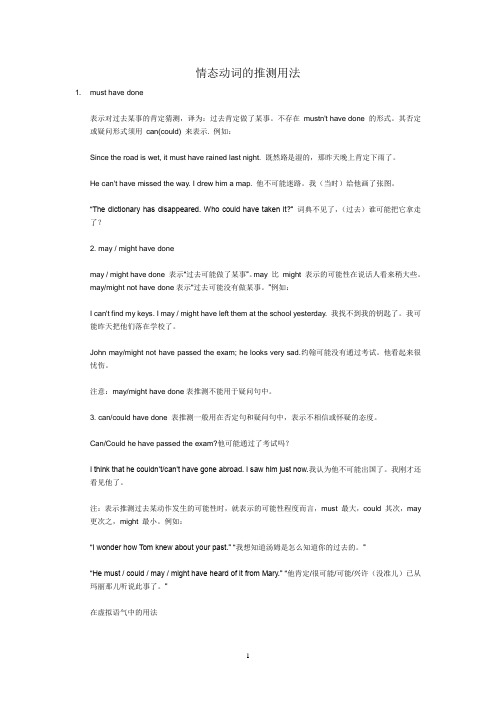
情态动词的推测用法1. must have done表示对过去某事的肯定猜测,译为:过去肯定做了某事。
不存在mustn't have done 的形式。
其否定或疑问形式须用can(could) 来表示. 例如:Since the road is wet, it must have rained last night. 既然路是湿的,那昨天晚上肯定下雨了。
He can't have missed the way. I drew him a map. 他不可能迷路。
我(当时)给他画了张图。
“The dictionary has disappeared. Who could have taken it?” 词典不见了,(过去)谁可能把它拿走了?2. may / might have donemay / might have done 表示“过去可能做了某事”。
may 比might 表示的可能性在说话人看来稍大些。
may/might not have done表示“过去可能没有做某事。
”例如:I can't find my keys. I may / might have left them at the school yesterday. 我找不到我的钥匙了。
我可能昨天把他们落在学校了。
John may/might not have passed the exam; he looks very sad.约翰可能没有通过考试。
他看起来很忧伤。
注意:may/might have done表推测不能用于疑问句中。
3. can/could have done 表推测一般用在否定句和疑问句中,表示不相信或怀疑的态度。
Can/Could he have passed the exam?他可能通过了考试吗?I think that he couldn‟t/can't have gone abroad. I saw him just now.我认为他不可能出国了。
情态动词表推测用法大全
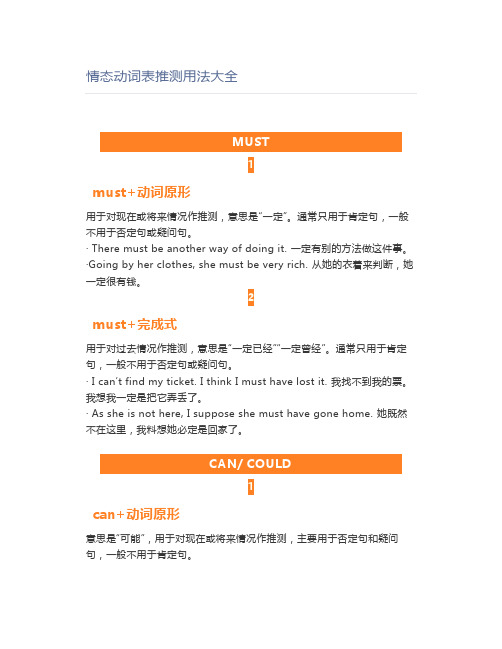
情态动词表推测用法大全1must+动词原形用于对现在或将来情况作推测,意思是“一定”。
通常只用于肯定句,一般不用于否定句或疑问句。
· There must be another way of doing it. 一定有别的方法做这件事。
·Going by her clothes, she must be very rich. 从她的衣着来判断,她一定很有钱。
2must+完成式用于对过去情况作推测,意思是“一定已经”“一定曾经”。
通常只用于肯定句,一般不用于否定句或疑问句。
· I can’t find my ticket. I think I must have lost it. 我找不到我的票。
我想我一定是把它弄丢了。
· As she is not here, I suppose she must have gone home. 她既然不在这里,我料想她必定是回家了。
1can+动词原形意思是“可能”,用于对现在或将来情况作推测,主要用于否定句和疑问句,一般不用于肯定句。
· That can’t be Mary —she’s in hosp ital. 那个人不可能是玛丽——她住院了。
· The moon cannot always be at the full. 月不可能常圆。
· You’ll see the building on your left. You can’t miss it. 那栋建筑在你的左手边。
你一定不会看不到的。
【注意】有时 can 表推测也用于肯定句,但主要表示理论上的可能性,即从理论上看是可能的,但实际未必会发生。
· Food poisoning can cause death. 食物中毒可导致死亡。
· Y ou can go to prison for dangerous driving. 鲁莽驾驶可导致入狱。
英语中情态动词表推测的用法
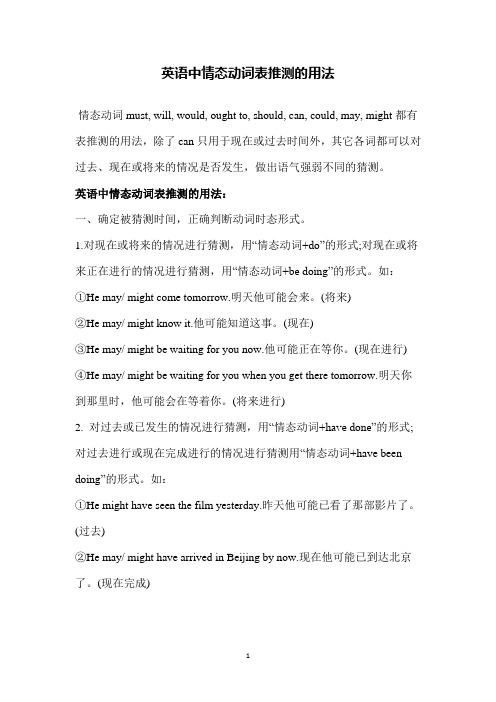
英语中情态动词表推测的用法情态动词must, will, would, ought to, should, can, could, may, might都有表推测的用法,除了can只用于现在或过去时间外,其它各词都可以对过去、现在或将来的情况是否发生,做出语气强弱不同的猜测。
英语中情态动词表推测的用法:一、确定被猜测时间,正确判断动词时态形式。
1.对现在或将来的情况进行猜测,用“情态动词+do”的形式;对现在或将来正在进行的情况进行猜测,用“情态动词+be doing”的形式。
如:①He may/ might come tomorrow.明天他可能会来。
(将来)②He may/ might know it.他可能知道这事。
(现在)③He may/ might be waiting for you now.他可能正在等你。
(现在进行)④He may/ might be waiting for you when you get there tomorrow.明天你到那里时,他可能会在等着你。
(将来进行)2. 对过去或已发生的情况进行猜测,用“情态动词+have done”的形式;对过去进行或现在完成进行的情况进行猜测用“情态动词+have been doing”的形式。
如:①He might have seen the film yesterday.昨天他可能已看了那部影片了。
(过去)②He may/ might have arrived in Beijing by now.现在他可能已到达北京了。
(现在完成)③He might have been waiting for you when you phoned him.你给他打电话时,他可能已在等你了。
(过去完成进行)二、把握猜测语气特点,选择恰当情态动词。
1. 熟记情态动词的语气特点和用法限制。
1)表示肯定的猜测时,各情态动词语气强弱如下:最强——must(一定)will (很有可能)would(很有可能)ought to(应该,很有可能)should(应该,很有可能)can(可能)could(可能)may(可能)最弱——might(可能)2)表示否定的猜测时can't / couldn't语气最强,指“不可能”;may / might not语气最弱,意思是“可能不”。
情态动词表示“推测”的用法

情态动词表示“推测”的用法英语中,情态动词can / could, may / might, must / can, would / should 等都可以表示“推测”。
具体用法如下:1. can 和couldcan 表示推测时,可能性比较大,用于疑问句或否定句中,不用于肯定句中,意思是“不可能”。
表示一种有把握的推测。
表示否定时,can’t语气最强。
如:It can’t be Mr Li. He has gone to Nanjing already.They can’t know the answer. Let me explain it to them.That can’t be her husband. She is still single.could 表示推测时,可以用于否定句,也可以用在后面跟不定式一般式的肯定句。
表示可能性不大的推测。
意思相当于may / might。
如:Anything could happen if you do not obey the rule.It could be true. But I still doubt it.2. may和mightmay / might 表示一种“可能性很小”的推测。
多用在肯定句或否定句中,might 用在疑问句中表示“可能”,语气最弱。
如:My English teacher may be correcting our exercises in her office.My sister may not be in her room at this moment.The scientists might be discussing the pollution problem.3. must 和can在表示推测的情态动词中,must 的把握最大,意思为“一定,肯定”。
表示对一般情况的推测。
如:Your sister must be a doctor, isn’t she?The boys must be playing football on the playground, aren’t they?Li Ping must be punished by his father.(以上几句要注意其反意疑问句的构成)can的推测用法:在肯定句中can 可以表示客观的(理论的)可能性,并不涉及具体某事是否会发生,此用法常常可以说明人或事物的特征。
情态动词表示推测的用法
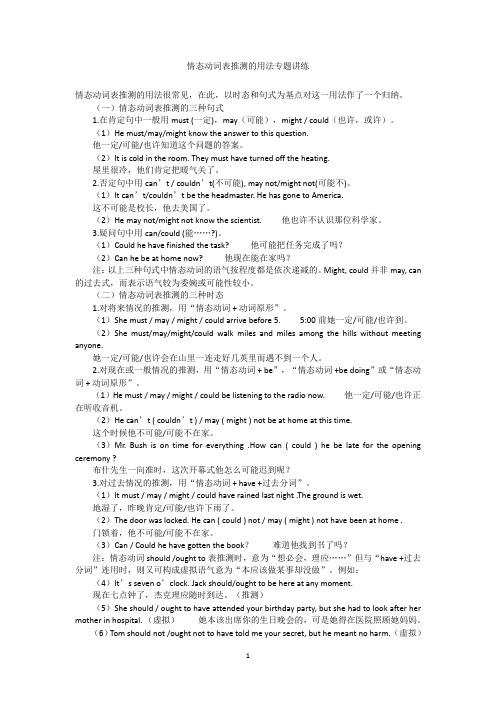
情态动词表推测的用法专题讲练情态动词表推测的用法很常见,在此,以时态和句式为基点对这一用法作了一个归纳。
(一)情态动词表推测的三种句式1.在肯定句中一般用must (一定),may(可能),might / could(也许,或许)。
(1)He must/may/might know the answer to this question.他一定/可能/也许知道这个问题的答案。
(2)It is cold in the room. They must have turned off the heating.屋里很冷,他们肯定把暖气关了。
2.否定句中用can’t / couldn’t(不可能), may not/might not(可能不)。
(1)It can’t/couldn’t be the headmaster. He has gone to America.这不可能是校长,他去美国了。
(2)He may not/might not know the scientist. 他也许不认识那位科学家。
3.疑问句中用can/could (能……?)。
(1)Could he have finished the task? 他可能把任务完成了吗?(2)Can he be at home now? 他现在能在家吗?注:以上三种句式中情态动词的语气按程度都是依次递减的。
Might, could并非may, can 的过去式,而表示语气较为委婉或可能性较小。
(二)情态动词表推测的三种时态1.对将来情况的推测,用“情态动词 + 动词原形”。
(1)She must / may / might / could arrive before 5. 5:00前她一定/可能/也许到。
(2)She must/may/might/could walk miles and miles among the hills without meeting anyone.她一定/可能/也许会在山里一连走好几英里而遇不到一个人。
【英语知识点】表推测的情态动词用法
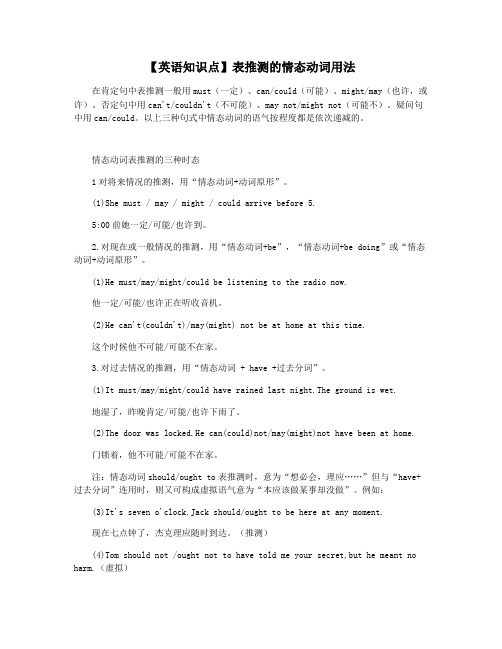
【英语知识点】表推测的情态动词用法在肯定句中表推测一般用must(一定)、can/could(可能)、might/may(也许,或许)。
否定句中用can't/couldn't(不可能)、may not/might not(可能不)。
疑问句中用can/could。
以上三种句式中情态动词的语气按程度都是依次递减的。
情态动词表推测的三种时态1对将来情况的推测,用“情态动词+动词原形”。
(1)She must / may / might / could arrive before 5.5:00前她一定/可能/也许到。
2.对现在或一般情况的推测,用“情态动词+be”,“情态动词+be doing”或“情态动词+动词原形”。
(1)He must/may/might/could be listening to the radio now.他一定/可能/也许正在听收音机。
(2)He can't(couldn't)/may(might) not be at home at this time.这个时候他不可能/可能不在家。
3.对过去情况的推测,用“情态动词 + have +过去分词”。
(1)It must/may/might/could have rained last night.The ground is wet.地湿了,昨晚肯定/可能/也许下雨了。
(2)The door was locked.He can(could)not/may(might)not have been at home.门锁着,他不可能/可能不在家。
注:情态动词should/ought to表推测时,意为“想必会,理应……”但与“have+过去分词”连用时,则又可构成虚拟语气意为“本应该做某事却没做”。
例如:(3)It's seven o'clock.Jack should/ought to be here at any moment.现在七点钟了,杰克理应随时到达。
情态动词对过去的推测的用法

情态动词对过去的推测的用法情态动词在对过去的推测时有以下几种用法:1. "must have + 过去分词":表示对过去发生的事情进行肯定的推测,认件事情过去一定发生了。
例如:He must have gone to the party last night.(他肯定昨晚去了派对。
)2. "could have + 过去分词":表示对过去发生的事情进行可能性的推测,认件事情过去可能发生了。
例如:She could have finished her homework before we arrived.(她可能在我们到达之前完成了作业。
)3. "may/might have + 过去分词":表示对过去发生的事情进行可能性较小的推测,认件事情过去可能发生了,但可能性不太高。
例如:He may have forgotten his keys at home.(他可能把钥匙忘在家里了。
)4. "should have + 过去分词":表示按理应该发生但事实未必发生的推测,表示事件过去本应该发生,但实际未必发生。
例如:They should have arrived by now, but they haven't shown up yet.(他们现在应该到了,但他们还没有出现。
5. "would have + 过去分词":表示对过去本来可能发生的情况进行推测,但实际并未发生。
常用于虚拟语气。
需要注意的是,这些情态动词的过去时形式通常为其现在时形式,否定形式通常在情态动词后加"not"。
情态动词表推测的五种情况
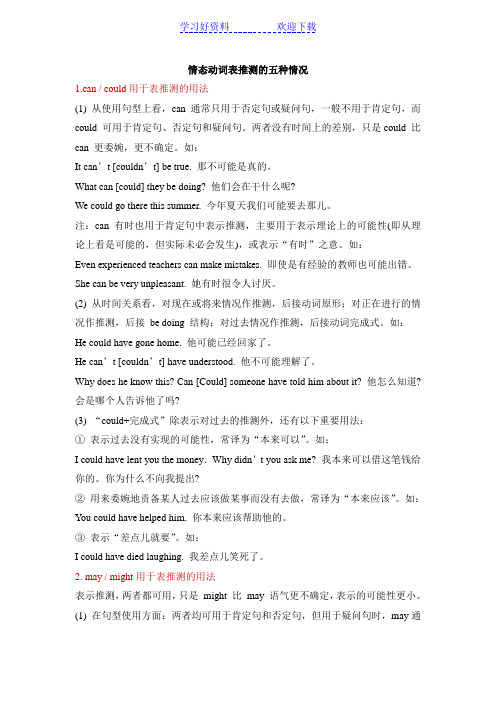
情态动词表推测的五种情况1.can / could用于表推测的用法(1) 从使用句型上看,can 通常只用于否定句或疑问句,一般不用于肯定句,而could 可用于肯定句、否定句和疑问句。
两者没有时间上的差别,只是could 比can 更委婉,更不确定。
如:It can’t [couldn’t] be true. 那不可能是真的。
What can [could] they be doing? 他们会在干什么呢?We could go there this summer. 今年夏天我们可能要去那儿。
注:can 有时也用于肯定句中表示推测,主要用于表示理论上的可能性(即从理论上看是可能的,但实际未必会发生),或表示“有时”之意。
如:Even experienced teachers can make mistakes. 即使是有经验的教师也可能出错。
She can be very unpleasant. 她有时很令人讨厌。
(2) 从时间关系看,对现在或将来情况作推测,后接动词原形;对正在进行的情况作推测,后接be doing 结构;对过去情况作推测,后接动词完成式。
如:He could have gone home. 他可能已经回家了。
He can’t [couldn’t] have understood. 他不可能理解了。
Why does he know this? Can [Could] someone have told him about it? 他怎么知道? 会是哪个人告诉他了吗?(3) “could+完成式”除表示对过去的推测外,还有以下重要用法:①表示过去没有实现的可能性,常译为“本来可以”。
如:I could have lent you the money.Why didn’t you ask me? 我本来可以借这笔钱给你的。
你为什么不向我提出?②用来委婉地责备某人过去应该做某事而没有去做,常译为“本来应该”。
初中表推测的情态动词小结
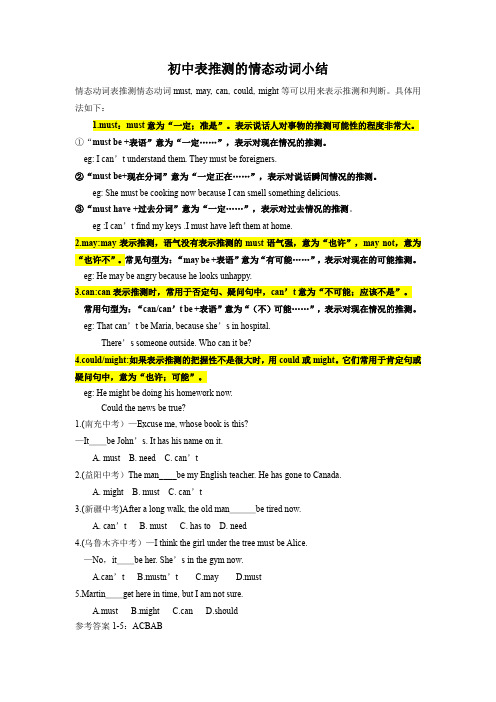
初中表推测的情态动词小结情态动词表推测情态动词must, may, can, could, might等可以用来表示推测和判断。
具体用法如下:1.must:must意为“一定;准是”。
表示说话人对事物的推测可能性的程度非常大。
①“must be +表语”意为“一定……”,表示对现在情况的推测。
eg: I can’t understand them. They must be foreigners.②“must be+现在分词”意为“一定正在……”,表示对说话瞬间情况的推测。
eg: She must be cooking now because I can smell something delicious.③“must have +过去分词”意为“一定……”,表示对过去情况的推测。
eg :I can’t find my keys .I must have left them at home.2.may:may表示推测,语气没有表示推测的must语气强,意为“也许”,may not,意为“也许不”。
常见句型为:“may be +表语”意为“有可能……”,表示对现在的可能推测。
eg: He may be angry because he looks unhappy.3.can:can表示推测时,常用于否定句、疑问句中,can’t意为“不可能;应该不是”。
常用句型为:“can/can’t be +表语”意为“(不)可能……”,表示对现在情况的推测。
eg: That can’t be Maria, because she’s in hospital.There’s someone outside. Who can it be?4.could/might:如果表示推测的把握性不是很大时,用could或might。
它们常用于肯定句或疑问句中,意为“也许;可能”。
eg: He might be doing his homework now.Could the news be true?1.(南充中考)—Excuse me, whose book is this?—It__be John’s. It has his name on it.A. mustB. needC. can’t2.(益阳中考)The man____be my English teacher. He has gone to Canada.A. mightB. mustC. can’t3.(新疆中考)After a long walk, the old man___be tired now.A. can’tB. mustC. has toD. need4.(乌鲁木齐中考)—I think the girl under the tree must be Alice.—No,it__be her. She’s in the gym now.A.can’tB.mustn’tC.mayD.must5.Martin__get here in time, but I am not sure.A.mustB.mightC.canD.should参考答案1-5:ACBAB。
情态动词表示推测的用法

情态动词表推测的用法专题讲练情态动词表推测的用法很常见,在此,以时态和句式为基点对这一用法作了一个归纳。
(一)情态动词表推测的三种句式1. 在肯定句中一般用must (一定),may(可能),might / could (也许,或许)。
(1)He must/may/might know the answer to this question.他一定/ 可能/ 也许知道这个问题的答案。
(2)It is cold in the room. They must have turned off the heating. 屋里很冷,他们肯定把暖气关了。
2. 否定句中用can' t / couldn ' t(不可能), may not/might not(可能不)。
(1)It can't/couldn ' t be the headmaster. He has gone to America. 这不可能是校长,他去美国了。
(2)He may not/might not know the scientist. 他也许不认识那位科学家。
3. 疑问句中用can/could (能⋯⋯?)。
(1)Could he have finished the task? 他可能把任务完成了吗?(2)Can he be at home now? 他现在能在家吗?注:以上三种句式中情态动词的语气按程度都是依次递减的。
Might, could 并非may, can 的过去式,而表示语气较为委婉或可能性较小。
(二)情态动词表推测的三种时态1. 对将来情况的推测,用“情态动词+ 动词原形”。
(1)She must / may / might / could arrive before 5. 5:00 前她一定/ 可能/ 也许到。
(2)She must/may/might/could walk miles and miles among the hills without meeting anyone.她一定/ 可能/ 也许会在山里一连走好几英里而遇不到一个人。
情态动词表推测
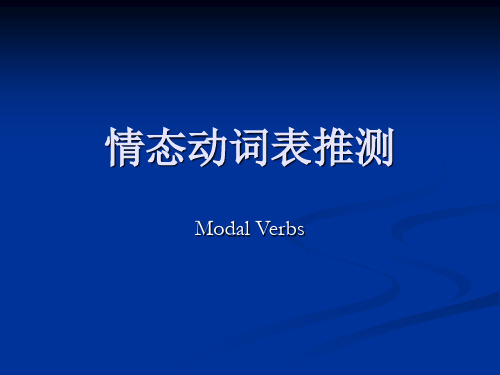
______ be at home. can’t 4. --Is this Lan Qiang’s boxing glove? --Is --Yes, it must be his. This’s his name on the back. --Yes, ____ may/might/could 5. You’d better take an umbrella. It ______________ rain this afternoon. must 6. It’s the library! So you ____ know shouting is not allowed here. 7. --Have you decided where to spend your summer --Have holiay? ma --Not yet. We ____ go to Qingdao. --Not y us a speech this evening? 8. --Is Jessica giving --Is --No, it can’t be her. She has been to Japan. --No, ____
9. --What will the weather be like tomorrow? --What --It _____ be rainy, cloudy or sunny. Who knows? --It might must 10. You _____ be tired after playing sports for a long time without a rest. 11. --Can I tell Peter about the news? --Can --No, I don’t want anyone else to know it. You --No, don’ must ____ keep it to yourself. 12. --Marry, I have cleaned the room for you. --Marry, --Thank you. Youneedn’t have --Thank ______________ it. I could manage it myself. done
情态动词的推测用法
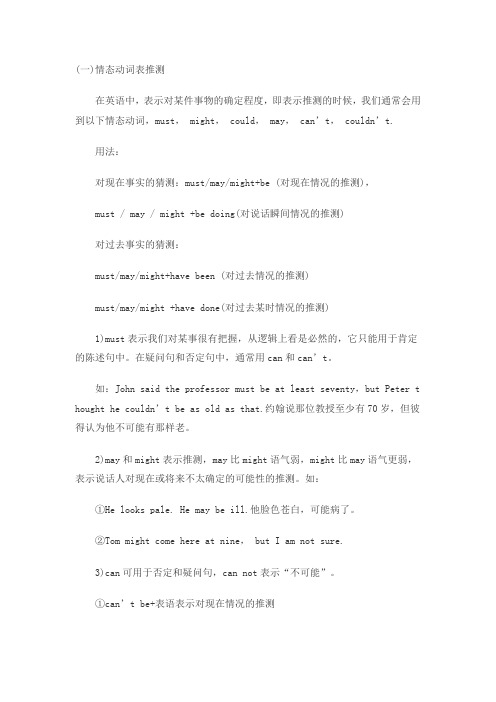
(一)情态动词表推测在英语中,表示对某件事物的确定程度,即表示推测的时候,我们通常会用到以下情态动词,must, might, could, may, can’t, couldn’t.用法:对现在事实的猜测:must/may/might+be (对现在情况的推测),must / may / might +be doing(对说话瞬间情况的推测)对过去事实的猜测:must/may/might+have been (对过去情况的推测)must/may/might +have done(对过去某时情况的推测)1)must表示我们对某事很有把握,从逻辑上看是必然的,它只能用于肯定的陈述句中。
在疑问句和否定句中,通常用can和can’t。
如:John said the professor must be at least seventy,but Peter t hought he couldn’t be as old as that.约翰说那位教授至少有70岁,但彼得认为他不可能有那样老。
2)may和might表示推测,may比might语气弱,might比may语气更弱,表示说话人对现在或将来不太确定的可能性的推测。
如:①He looks pale. He may be ill.他脸色苍白,可能病了。
②Tom might come here at nine, but I am not sure.3)can可用于否定和疑问句,can not表示“不可能”。
①can’t be+表语表示对现在情况的推测如:He can’t be her father; he is too young. 他不可能是她的父亲,他太年轻了。
②can’t have +过去分词表示对过去情况的推测。
如:He can’t have got the Chinese book.4)could的用法:could可以代替can,表示现在时间的动作,但语气较为婉转客气或更加不肯定。
英语中情态动词的表示形式

英语中情态动词的表示形式一、情态动词表推测的三种形式1.情态动词+动词原形,表示对现在某动作或状态的推测,比如must do,can't be等。
例:It can't be true.这不可能是真的。
2.情态动词+动词进行式,表示推测某动作可能正在进行,比如must be doing等。
例:Lily must be doing her homework now.莉莉现在一定是在做作业。
3.情态动词+动词完成式,表示对过去行为或动作的推测,比如must have done等。
例:He must have misunderstood me.他一定是误解了我。
二、情态动词表推测的具体含义不同的情态动词与行为动词搭配,其具体含义会有所不同。
这里,我们主要针对"情态动词+have done"结构,详细讲解其含义。
1.must have done:推测某事必定已经发生,只用于肯定句,否定形式用can't have done。
例:The light is on.Father must have come back.灯亮着,爸爸一定已经回来了。
2.could have done:对已发生的事的可能性进行推测。
例:The dictionary has disappeared.Who could have taken it?字典不见了。
会是谁拿了呢?could have done还可以表示某事本来可能发生却未发生。
例:I could have slept for long,but Ididn't.我本来可以睡的时间长一点儿,但是我没有。
3.can't/couldn't have done:表示某事不可能已经发生,couldn't have done语气更委婉。
例:She can't have gone to school.It's Sunday.她不可能去上学了。
- 1、下载文档前请自行甄别文档内容的完整性,平台不提供额外的编辑、内容补充、找答案等附加服务。
- 2、"仅部分预览"的文档,不可在线预览部分如存在完整性等问题,可反馈申请退款(可完整预览的文档不适用该条件!)。
- 3、如文档侵犯您的权益,请联系客服反馈,我们会尽快为您处理(人工客服工作时间:9:00-18:30)。
情态动词的推测性用法的几种结构:A.情态动词+BE+ 表语。
表示对现在情况的推测。
It can’t be true. He must be a professor.They should be back by now.B. 情态动词+动词进行体。
表示对现在正在进行的情况进行推测。
You shouldn’t be working like that.Let’s hurry up. They must be waiting for usHe can’t be tellin g the truth.C. “情态动词+have+过去分词”表示对过去某种行为的推测。
情态动词的这种用法是各类考试中测试的重点内容,应该充分注意。
①must have+过去分词,意思是“想必,一定已经……”表示对过去已发生的事情进行肯定推测判断。
---“Why isn’t he here?”---“He must have missed the bus”It must have rained last night. The ground is wet.I think my letter must have been miscarried.②can not/can’t/couldn’t +have+过去分词,意思是“某件事情(过去)不可能发生,表示对过去发生的事情可能性进行否定推测判断。
Li Ping can’t have been home. I saw her just now.You can’t have finished your homework in such a short time.She can’t/couldn’t have seen the film last yea r, it was on only recently.③can/could+have+过去分词,表示对过去已发生的事情进行推测判断,常用于疑问句中。
Can /Could she have lost the book borrowed from the library?注:could have +过去分词偶尔也可以用在否定句中,表示过去某事本可以发生,但是却没有发生。
It was too dark last night. You could have lost your way.(事实上并没有迷路)。
④May/Might +have+过去分词,表示对过去已发生的事进行推测判断,一般只用于肯定句或否定句中,不用于疑问句中。
May/Might +have+过去分词的意思是“可能已经”,“或许”;may/might not+have+过去分词的意思是“可能不(没有)”。
You might have read the book before. The train may have left already.You were so careless that day. You might have make a bad mistake.(事实上并没有犯错误)。
She might not have noticed the warning on the wall. That was why he parked there.⑤should/ought to+have+过去分词:表示过去本应该做而实际上并未做的事,并含有责备的意思。
eg, You should/ought to have come five minutes earlier.你应该早来五分钟的(而实际上并没有)。
注:它的否定式should n’t /oughtn’t to +have+过去分词则表示做了不该做的事。
eg, You shouldn’t/oughtn’t to have kept the books in the damp place.(而实际上书已放在潮湿的地方了)。
⑥needn’t +have+过去分词:表示本来不必做某事而实际上已经做了某事,强调“不必要……”常有责备之意。
eg, You needn’t have woken me up; I don’t have to go to work today.(而实际上已把他叫醒了)。
在上述结构中,can / could主要用于否定句和疑问句;may / might主要用于肯定句,间或用于否定句,但不用于疑问句;must只用于肯定句;should / ought to 可用于肯定句和否定句,但不用于疑问句;need只用于否定句。
几道习题:1.John Glenn’s return to space at the age of 77demonstrates that aging , but enjoyed.A needs not be feared B. need not be fearedC. doesn’t need be fearedD. be not feared2.Richard went to the shop because he a suit forhis job interview.A. need to buyB. needed to buyC. needed buyD. did need buy3.He gave up politics when he a great career in it.A. must have madeB. might makeC. might have madeD. need have made4.A traveler who once set his foot on that land thegreat changes happening there.A. must have noticedB. must noticeC. must be noticingD. would have noticed5.-----I’ve be en looking for you all day.-----you couldn’t all day.A. have swumB. be swimmingC. have been swimmingD. to swim6.The formal opening ceremony of the exhibitionhours ago.A. ought to be begunB. ought to beginC. ought to have been begunD. ought to have begun7.You such a long essay. The teacher only askedus to write 300 words, and you have written 600.A. mustn’t have writtenB. needn’t have writtenC. didn’t have to writeD. didn’t need to write8.-----I saw Jane at the party last night.-----You her because she had gone abroad with her parents.A. couldn’t have seenB. couldn’t seeC. mustn’t have seenD. needn’t have seen9.-----it’s time for supper. Jacob is still in his room.-----He about the question his teacher raised.A. might still be thinkingB. might still thinkC. might still have thoughtD. still thinks10.-----Bob earns more in one day than I do in a week.----- He very wealthy.A. must have beenB. has to beC. must beD. has to have been11.What are you doing now? You yourtextbook instead of wasting time on the novel.A. should have been readingB. should readC. would have readD. should be reading12.-----What can I do for you?-----If you see Mr. Allen, give him my regards.A. shouldB. wouldC. shallD. will13.Since the flight has been cancelled because of badweather, we by train.A. Ought to have goneB. might as well goC. had better to goD. would rather not14.It’s claimed that as many as 2 billion people theopening game of the 1998 would cup held in France.A. should watchB. might watchC. might watchD. may have watched15.These cells cannot be used any more. You themin some dry place.A. need to putB. could putC. should have putD. must have put.。
